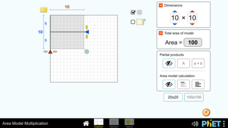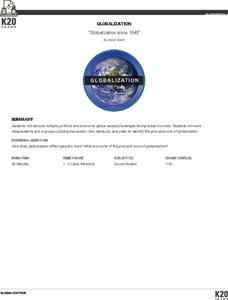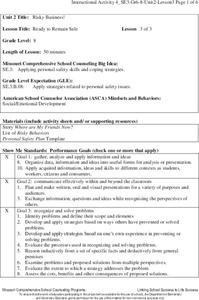National Nanotechnology Infrastructure Network
Small Scale Stenciling: Mask Lab
Investigate the procedure for developing computer chips! Learners use solar print paper to create both positive and negative images. They observe the effects of single and multiple exposures and compare results.
University of North Carolina
Clichés
When it comes to writing, cliches are as old as dirt. A handout on tired phrases provides examples of cliches, as well as a description of the negative effects they have on a paper. Writers discover specific words and phrases to avoid,...
Physics Classroom
Work
Current work lesson plan just not ... working? Add an engaging interactive that helps pupils explore positive and negative work relationships! Individuals assess situations to determine what type of work, if any, the resource describes....
Facebook
Healthy Relationships Online
Chatting, texting, commenting—there are so many options for online communication! How do teens know what's appropriate? Social scholars collaborate to define the elements of a healthy online relationship during an activity-packed digital...
College Board
2018 AP® Human Geography Free-Response Questions
What role do women play in agrarian economies? How has gentrification affected neighborhoods in positive and negative ways? To what extent has language evolved over time? Learners consider these questions using authentic test questions...
College Board
2017 AP® Computer Science A Free-Response Questions
Here's a great way to prepare for the AP exam format. A PDF file supplies the four free-response questions from the 2017 AP Computer Science A exam. Questions involve identifying and processing the digits of a non-negative integer and...
College Board
2013 AP® Environmental Science Free-Response Questions
While well intentioned, human intervention sometimes has negative effects. Learners explore this and other environmental topics as they respond to four free response exam questions. Topics span from the implementation of bioelectric cars...
CCSS Math Activities
Smarter Balanced Sample Items: 6th Grade Math – Target D
Elevation often confuses people due to a misunderstanding of negative numbers. Scholars practice applied elevation problems in addition to absolute value and coordinate pair questions. Each slide presents one question to help pupils...
PHET
Area Model Multiplication
Develop a solid understanding of multiplication. The interactive provides opportunities for learners to continue building a deep understanding of multiplication. Pupils use the application to find the product of two numbers and find...
McGill University
Emotional Regulation
A unit of 10 scripted lessons is designed to help learners develop awareness of their emotions and of positive coping strategies they can use to regulate their emotions. They also learn how to replace negative strategies like self-blame...
Missouri Department of Elementary
Goldilocks Revisited
After a read-aloud of the story Goldielocks and the Three Bears, scholars gather into small groups to answer a series of questions. Peers examine the idea of smart decisions and identify three feelings of characters alongside three...
Missouri Department of Elementary
An Apple a Day
Three apples—green, red, and rotten—exemplify character traits, negative and positive. Following a discussion about the classroom community, scholars complete an apple-themed worksheet that challenges them to read each trait, color it...
Missouri Department of Elementary
I’m Thumbody!
Positive and negative thinking is the focus of a lesson that boost self-awareness. Beginning with a whole-class discussion, scholars brainstorm what positive thinking looks and sounds like then compares and contrast the two types of...
K20 LEARN
Globalization Since 1945
Using sources from various publications and a series of videos, pupils consider the global economy and the positive and negative effects of globalization. With a jigsaw discussion and a writing assignment, scholars weigh in on whether...
Missouri Department of Elementary
Communicating with I-Messages (1/2)
Scholars watch two puppet dialogues illustrating negative and positive communication between friends. Then, they discuss how the puppets' communication skills influenced the outcome of each interaction.
Missouri Department of Elementary
Dealing with Peer Influence: What Are Bullying and Harassment?
Scholars examine examples of peer pressure and discuss how specific actions negatively affect one's well-being. Learners gather in small groups to write two scenarios in which peer pressure is used. They reference the STAR method in how...
EngageNY
Forming a Research-Based Claim: Comparing Cascading Consequences
It's time to weigh the risks and benefits of screen time! Pupils work in triads to identify the strongest positive and negative consequences from their Cascading Consequences chart. Next, using the chart and their researcher's notebooks,...
EngageNY
Evaluating an Argument: “Is Google Making Us Stupid?”
Does the Internet negatively affect peoples' brains? Scholars complete a Tracing an Argument note catcher to evaluate the question as they read the text "Is Google Making Us Stupid?" Exploring both sides of the issue, they add their...
EngageNY
Forming a Research-Based Claim: Introducing Stakeholders and Consequences
Consequences, consequences. Using the resource, scholars engage in a class discussion about the repercussions of too much screen time. Next, they create a Cascading Consequences chart that lists the positive and negative effects of...
Teaching Tolerance
How Online Communication Affects Privacy and Security
Digital footprints leave a lot of clues behind! Pupils discuss the positives and negatives of having a digital footprint and what it means. Then, using a handout, scholars learn ways to protect their online privacy.
American Museum of Natural History
Are YOU Cut Out for Antarctica?
Negative 80 degrees Fahrenheit, you say? Scholars complete a quiz to gauge their adaptability to the extreme climate of Antarctica. The quiz scored online gives them feedback of their likelihood of surviving in Antarctica.
Missouri Department of Elementary
Putting on Armor
Peers can exert tremendous pressure that can lead to positive and negative consequences. To conclude the Risky Business unit, class members create a Personal Safety Plan. They list things or situations that cause stress, things they have...
Nemours KidsHealth
Peer Pressure: Grades 6-8
Middle schoolers practice techniques they can use to get safely out of uncomfortable situations involving peer pressure. One activity engages class members in role-playing two scenarios; the first modeling negative peer pressure, while...
Missouri Department of Elementary
The Clique
Mean girls and bully packs are favorite topic for films and TV shows that focus on the destructive power of cliques. High school freshmen are asked to reflect on both the positive and negative aspects of cliques by reading a short...
Other popular searches
- Negatives
- Negative Integers
- Negative Numbers
- Negative Exponents
- Double Negatives
- Negative Effects of Smoking
- Negative Space
- Negative Traits
- Positive and Negative Integers
- Positive and Negative Numbers
- Negative Feedback
- Positive and Negative Risks

























